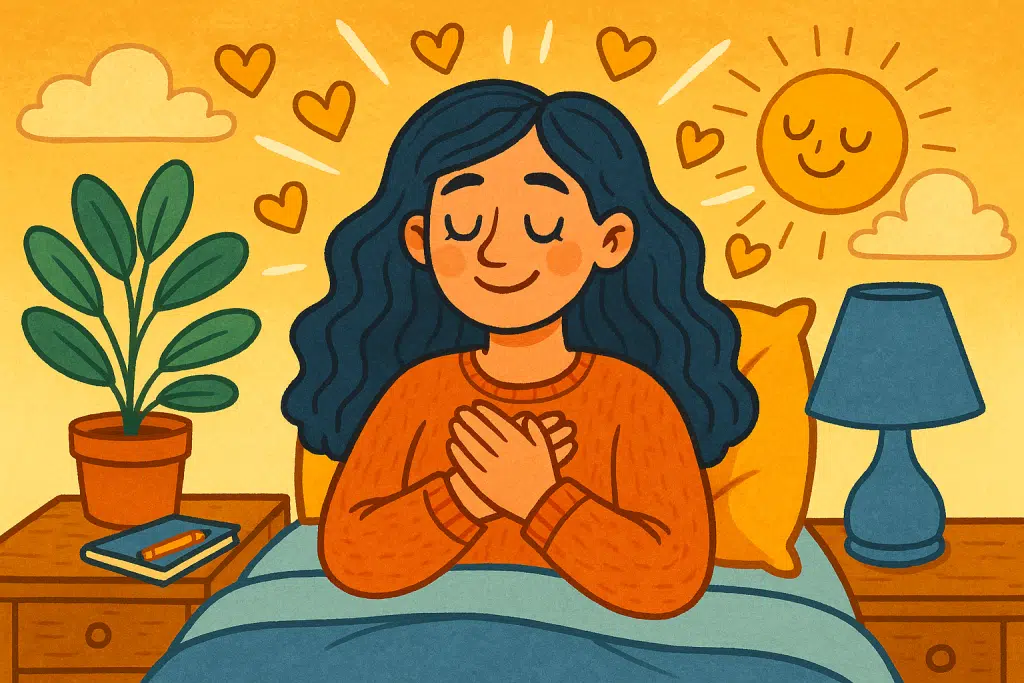Practicing Gratitude Every Day Can Shift Your Mindset
Charlotte Stone August 8, 2025
Here’s the real talk: Practicing Gratitude Every Day Can Shift Your Mindset—and yeah, that’s not just spiritual pep talk. I’m talking actual brain chemistry, career-level upgrades, and long-term mental peace. In a world glued to hustle culture hype, letting gratitude steer your mindset might feel almost rebel‑ish. But it’s weirdly powerful, and trendy in a quiet, “I’ve got my head together” kind of way.

1. Why Gratitude Is Your Mindset’s Best Friend (Backed by Science)
Daily gratitude isn’t just “feel-good” fluff. It changes your brain and boosts your mood.
- Brain Rewards: When you genuinely say “thank you” (to yourself, your plate of scrambled eggs, whatever), your brain lights up with oxytocin—and yes, that’s the bonding, trust‑building hormone. So gratitude is literally giving your brain a warm hug.
- Mood & Mental Health: UCLA found that practicing gratitude for just 15 minutes, five days a week over six weeks reduces depression and anxiety, improves sleep, supports heart health, and even regulates breathing.
- Longevity Alert: A massive Nurses’ Health Study in JAMA Psychiatry (July 2024) showed gratitude correlates with longer lives—so yes, thank-you notes may be wellness hacks.
- Meta-Metalcalm: A huge meta‑analysis of 64 randomized trials confirmed gratitude interventions boost feelings of gratitude, life satisfaction, mental well‑being, while lowering anxiety by ~7.8% and depression by ~6.9%.
So yeah—practicing gratitude every day can shift your mindset, even physically and long-term. This isn’t new-age nonsense; it’s neuroscience.
2. Gratitude at Work: The Unexpected Career Hack
Workplace productivity, vibes, retention, creativity—gratitude levels them all up.
- Engagement & Retention: Harvard Business Review reports gratitude boosts engagement, productivity, and retention rates. Feel appreciated? You stick around, work harder.
- Creative Flow & Collaboration: Research shows gratitude reduces stress, which in turn frees up your creative brain. Teams practicing gratitude score higher on creativity, collaboration, and productivity.
- Pandemic-Proof Resilience: Even during wild times (hi, 2020s), South African workers grateful for a caring workplace, flexibility, and optimism stayed resilient.
- Immediate Happiness Boost: A gratitude shout-out can give a 10% happiness spike and a 35% drop in depressive symptoms—like instant coffee for the soul.
- Recognition = Productivity: One case from Benin showed simple thanks increases productivity by up to ~86–90%. That’s the ROI of “Nice work.”
So if your career’s feeling stuck or you just want more zing in your professional life, leaning into gratitude might be the low-effort, high-return move you didn’t know you needed.
3. Modern Twist: Gratitude and Tech—Apps That Actually Wor
“But how do I remember to do it?” I hear you. Enter gratitude apps—low-dose daily nudges.
- A 2024 user-centered study designed an app for young adults that offers reflection prompts, mood labels, and passive reminders. The result? Better well‑being and connection—without needing serious dedication.
- It’s a trend that makes gratitude legit, tech-savvy, and actually sustainable.
So yeah, practicing gratitude every day can shift your mindset—especially when aided by smart reminders that don’t guiltrip your soul.
4. How to Build a Gratitude Habit That Sticks
Let’s make it easy, not cringe. Try these:
- Pick your format: gratitude journal, voice memo, quick note on your phone—whatever fits your style.
- Start with 3 Good Things: At night, jot down three things that went right and why. Do this daily for a week. Studies show it raises happiness and reduces depression—even maintained at 3‑ and 6‑month follow-ups.
- Or go weekly: If daily is too much (I feel you), try weekly entries. Research suggests even weekly gratitude journaling can boost well‑being—daily isn’t always more effective.
- Mix in gratitude visits: Writing and delivering a gratitude letter or expressing it in person boosts happiness by around 10%, and reduces depression short-term.
- Set a non-annoying reminder: Use your app or calendar. Gentle, not nagging.
- Remember—even small counts: Research from Harvard and UCLA show small-but-consistent gratitude can shift your mindset over time.
5. Real-Life Example: Meet “Sarah the Burn-Out Marketer”
Sarah, 28, was spinning her wheels with content deadlines, algorithm whiplash, and selfie fatigue. She started doing three-good-things and once-a-week gratitude journaling. Six weeks later:
- Mood lifted (her offline friends noticed).
- Sleep improved (less midnight doom-scrolling).
- Creative spark returned—writing emails felt less like torture and more like chats with friends.
- Her boss noticed her shift from frazzled to focused—and offered her a coaching assignment.
She tells friends, “Practicing Gratitude Every Day Can Shift Your Mindset,” and no, she’s not on a cult—she’s literally less stressed, more aligned, and more present. That’s the shift we’re chasing here.
6. Why This Trend Matters Now
- Mental health crisis: Anxiety, burnout, and exhaustion are sky-high. Gratitude is free, accessible, and scientifically proven to help.
- Hybrid-work fatigue: With remote work blurring boundaries, gratitude anchors you. It’s low-cost and boosts connection—even when your team’s stuck in tiny Zoom boxes.
- Gen Z and authenticity: We crave real, not polished. Gratitude gives us authenticity—telling ourselves and others, “I see you, and this matters.”
Conclusion
Let’s wrap this up: Practicing gratitude every day can shift your mindset—and it’s far from a culty hashtag. It’s backed by brain science, boost-your-career stats, and even longevity data. It doesn’t cost much, except a few quiet minutes and some honest thoughts.
The beauty of gratitude lies in its accessibility. You don’t need expensive courses or perfect conditions. Whether you’re commuting, lying in bed before sleep, or taking a brief break, you can pause and acknowledge what’s working in your life.
What starts as a simple exercise often becomes something deeper. Regular gratitude practice doesn’t just make you feel better—it changes how you see challenges. Problems don’t disappear, but they become more manageable when viewed alongside life’s positive elements. The ripple effects extend beyond personal wellbeing too. When you approach relationships with appreciation, people notice.
Grab a notebook, your phone voice memo, or your gratitude app. Start small. Keep it simple. Maybe it’s three things on Sunday evenings, or a single moment of appreciation during your morning coffee. Don’t worry about doing it perfectly—the practice works even when it feels mechanical at first.
Over time? You’ll notice the difference. It might be subtle initially, but eventually gratitude becomes more automatic, influencing how you interpret daily experiences and interact with others.
References
- Emmons, R. A., & Stern, R. (2013). Gratitude as a psychotherapeutic intervention. Journal of Clinical Psychology, 69(8), 846–855. https://doi.org
- Wong, Y. J., Owen, J., & Gabana, N. T. (2016). Does gratitude writing improve the mental health of psychotherapy clients? Evidence from a randomized controlled trial. Psychotherapy Research, 28(2), 192–202. https://doi.org/
- Harvard Health Publishing. (2021). Giving thanks can make you happier. Harvard Medical School. https://www.health.harvard.edu







